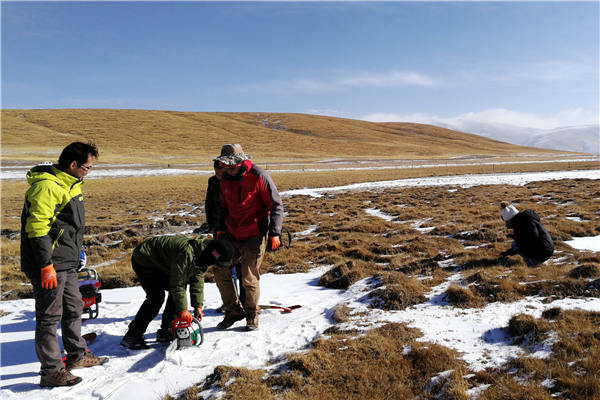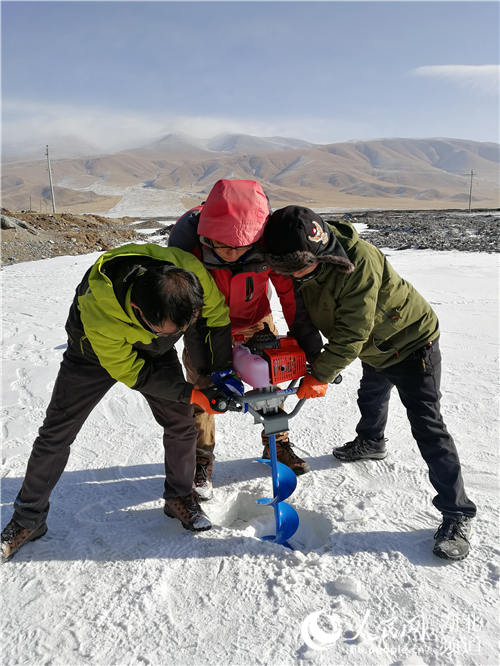Having completed a 20-day hydrogeological field survey in the upper reaches of Heihe River in the middle section of Qilian Mountains, the research team, led by Prof. SUN Ziyong, composed of eight instructors and students from School of Environmental Studies at CUG, have returned Wuhan from Qinghai Province, thousands of miles away, on January 27, 2019. The team’s specialty is hydrogeology in alpine and cold regions. What have they found out over there?

There are bright prospects for hydrogeological survey in high altitudes and cold mountainous area
As is known to all, field surveys tend to be conducted in the summer, but why did the research team make the survey in the cold winter, especially when the Spring Festival is approaching? With abundant water sources such as glacier melt water, atmospheric precipitation, and supra-permafrost water, the recharge sources to the sub-permafrost water cannot be guaranteed. In winter, it is a good opportunity for the study on hydrogeology as glacial melt water, rainfall runoff and supra-permafrost water is frozen by the extreme cold and the recharge sources can be found.
The Qilian Mountains, which are the cradle of three inland rivers: the Shiyang River, the Heihe River and the Shule River, are known as “River of Life" in the Hexi Corridor, and is an ecological barrier in the western part of China. Over 20 days the team traveled from the source of the western branch to main stream in the upper reach of the Heihe River and its sub-basin in the middle section of Qilian Mountains which stretches 250 kilometers, the research team discovered the recharge sources to sub-permafrost water. The data and samples collected will also be used for National Natural Science Foundation Program "Hydrological Process of permafrost in Alpine and Cold Regions and its impact on Dissolved Organic Carbon Output in Rivers (2018-2021)" and the Class A Chinese Academy of Sciences Program "Isotope Investigation of Hydraulic Connection and Water Environment Change in Permafrost Areas of Qilian Mountains" (2018-2022).
Prof. SUN Ziyong said, unique landform and sediment in alpine and cold regions not only provide good conditions for the formation of surface runoff, but also serve to help groundwater play an important role in the formation and adjustment of river runoff.
However, study on hydrogeological processes in alpine and cold regions has not been valued highly for a long time. Effected by permafrost, complex and unique hydrogeological process in alpine and cold regions makes field survey especially necessary. However, large-scale hydrogeological surveys in alpine and cold regions have not been conducted around the world. And hydrogeology in permafrost-dominated areas is still a work in progress.

Field survey reveals the true nature of China University of Geosciences
Qilian Mountains——a great place for cryospheric science, has attracted the attention of many scholars for a long time. Scientific research institutes and universities have conducted many studies on the formation of river runoff in alpine and cold regions, climate change, and the change of glacier and permafrost under the impact of and human activities as well as its eco-hydrological effects. Compared to other research teams, the research team led by Professor SUN focuses more on the storage of groundwater in the high altitude and cold environment, the exchanging relationship between surface water and groundwater, the role of groundwater in the river runoff and its responses to climate change and mineral exploitation.
Despite the extreme environment, the research team still conducted the field surveys. They overcame all of the difficulties of investigation and sampling. Professor Sun Ziyong used the field trip as a good way of imparting knowledge on ecological environment, hydrogeology and geological phenomena to students. In this way students were taught to observe and think, which improved their analytical and problem-solving skills.
Since 2011, the team has carried out field surveys on the upper reaches of the Heihe River in the Qilian Mountains. It has undertaken a number of research projects and built a small experimental watershed with an area of more than 20km2 and completed observation elements under cooperation with the Chinese Academy of Sciences. Over the past eight years, the team has reached remarkable achievements in the hydrogeological processes in alpine and cold regions.
The team will perform further scientific research by testing and analyzing groundwater samples collected in the field survey. Professor SUN Ziyong hopes these field trips will empower students to endure hardship, embrace challenge and learn to innovate.
(Translated from an article on Voice of China University of Geosciences)